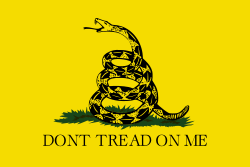Imagine a libertarian in the United States. It’s midnight, and he’s sitting at home in his underwear, binge-watching Better Call Saul reruns when he hears the door knob rattling. He spots the silhouette of a suspicious figure trying to gain entry. Is this person looking to rob the house, harm the homeowner, or who knows what?
So anyway, what does the libertarian do? He grabs his gun, which is basically required of all libertarians to own, and as soon as this miscreant steps an uninvited foot into our hero’s home, Captain Liberty turns him into Swiss cheese!
![i-started-blasting-so-anyway-i-started-blasting[1]](https://logicallibertarian.com/wp-content/uploads/2023/09/i-started-blasting-so-anyway-i-started-blasting1.gif?w=324&h=303)
Libertarians are staunch supporters of the Second Amendment and the right to bear arms because they believe it levels the playing field in potential combat situations between individuals.
In the pursuit of freedom, people must have the means to defend themselves using the tools available to them. While it’s possible the intruder is a 120-pound weakling with no weapon and minimal combat skills, our libertarian homeowner, clad only in his underwear, can’t afford to take chances. He must prepare for the worst and ensure that he’s in the best possible position should a confrontation ensue.
As someone who identifies philosophically with libertarianism, I agree with this sentiment entirely. I own several handguns, which I have placed strategically in my home and cars in case someone hurts my feelings. I’ve never drawn down on anyone, but if me, friends, or loved ones are threatened, I’ll do my best to end the threat.
Contrast all this with another tenet of libertarianism—the peacenik. Someone who is staunchly anti-war. How can one support owning a gun as a right, but still be all about peace?![s-l1600[1]](https://logicallibertarian.com/wp-content/uploads/2023/09/s-l16001.jpg?w=281&h=281)
I’d like to think most people understand that being anti-war doesn’t mean anti-self-defense. Many reasonable libertarians agree the country should have a military prepared to defend our nation, in the same manner as they personally might be armed in such a way to defend their home.
The issue I’m raising here, is about being unprepared.
Today, we face potential threats from Russia, North Korea, and China, and the specter of a catastrophic conflict looms, especially if nuclear weapons come into play.
This scenario seemed very unlikely 10-15 years ago. Even President Obama seemed oblivious to the idea Russia could be a threat. Remember this debate where he degraded Romney’s opinion on Russia?
This issue is where I often find myself breaking with ideological libertarians, because as someone who places logic & reason over ideology, I think being prepared for the worst-case scenario, is the wisest thing to do.
I also oppose wars of aggression. We shouldn’t be attacking others who weren’t threatening us or our allies. However, it’s naive to assume that we won’t face a serious threat at some point. We must ensure we’re fully prepared. If attacked, we should respond with overwhelming force to swiftly end the conflict. Appearing weak and easily exploited is not a winning strategy.
Those who were around during the Reagan era, might recall the talk of a Strategic Defense Initiative (SDI) program, also known as “Star Wars.”
To say this program was ambitious, would be an understatement. I won’t try to explain how this system worked entirely, but it was multi-faceted, expensive as hell, and involved things like space lasers.
Reagan felt nuclear weapons were inherently immoral, and that eliminating the threat of them from Russia at the time, was in the interest of all mankind.
But as the Berlin Wall fell, and Russia became our BFFs, the need for such initiatives was considered obsolete. So spending on such technology was thought to be frivolous and wasteful.
Many libertarians go a step further and bash military spending almost entirely, using derogatory terms like “bootlicker” for anyone who disagrees with them.
Such insults hinder productive debate and reveal a lack of intent to discuss the topic fairly. We can acknowledge instances of wasteful military spending while recognizing the importance of maintaining a strong defense against existing threats.
While it’s true Russia and China were largely friendly to the United States between Reagan’s tenure and now, we find ourselves in a position of defending Taiwan and Ukraine, and in so doing, being under threat of nuclear attack from countries we thought were our friends.

We should all be able to agree there are instances of large wasteful spending on the military. Especially when it’s for a weapon the military says it has no need for.
But being anti-war should not mean cutting spending in such a way as to make ourselves vulnerable to an existing threat.
While China and Russia were becoming rather friendly with the US, they weren’t exactly eliminating their nuclear arsenal—the threat was there the whole time.
Ronald Reagan was right that the best thing we could do for the future of mankind, was to find a way to make such weapons “impotent and obsolete” as he put it.
Libertarians are correct to oppose wars of aggression. But just as they keep guns to protect themselves from unlikely threats—it would be hypocritical to think the US and our NATO allies shouldn’t advance technology to eliminate the threat of other nations, even from those we currently consider friendly.
The free world should understand that Oppenheimer and company opened Pandora’s box of human mass eradication, and working towards systems that can neutralize that threat is spending that shouldn’t be criticized nearly as much as it is.

We are on the brink of human extinction from not one, not two, but two and a half dictators (I’m not elevating North Korea to the level of Russia and China). While they were friendly once, the threat never fully went away, it was just our resolve to prepare for it that did. That lax attitude could end us all.
Our current defense systems are thought to be about 50-60% effective at stopping such weapons from hitting their targets. That’s not good.
If we were to face a nuclear catastrophe at the hands of Russia and China, it might have been preventable had we stayed vigilant. Remember the old adage: Si vis pacem, para bellum – if you wish for peace, prepare for war.





![29zZnh0j[1]](https://logicallibertarian.com/wp-content/uploads/2014/10/29zznh0j1-e1562001256653.jpeg?w=302&h=302)

![No_gun[1]](https://logicallibertarian.com/wp-content/uploads/2012/12/no_gun1.jpg?w=300&h=300)




![911[1][1]](https://logicallibertarian.com/wp-content/uploads/2014/12/91111.png?w=300&h=207)








